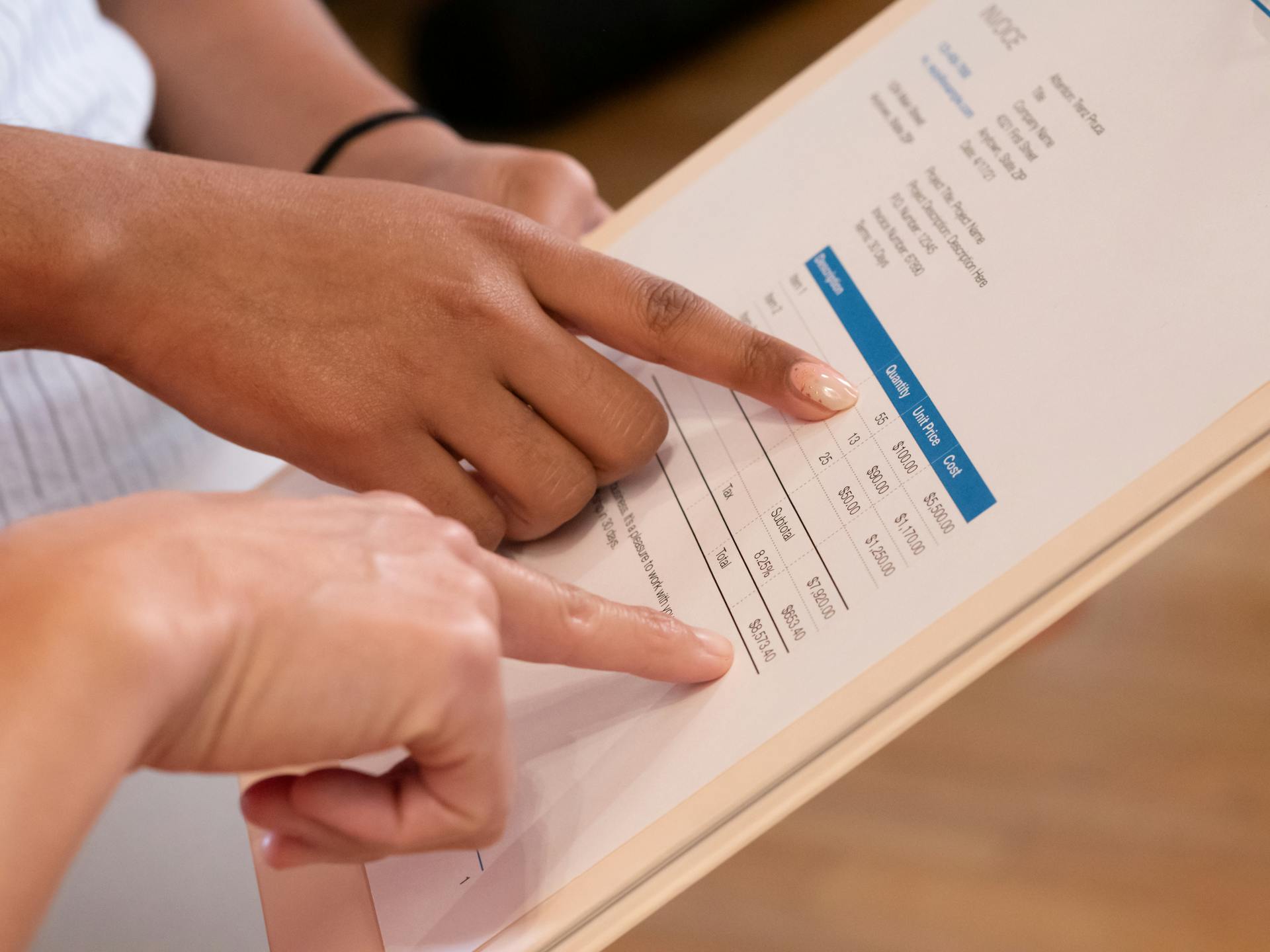
Mortgage rates can fluctuate significantly from day to day, making it challenging for homebuyers and refinancers to predict their costs. This is because mortgage rates are influenced by a complex array of factors.
The Federal Reserve plays a crucial role in setting monetary policy, which in turn affects mortgage rates. The Fed's decisions on interest rates can cause mortgage rates to rise or fall.
In addition to the Fed's actions, the bond market also impacts mortgage rates. Mortgage-backed securities, which are essentially bundles of mortgages, are traded on the bond market. When demand for these securities increases, their prices rise, causing mortgage rates to fall.
The overall state of the economy, including inflation and employment rates, can also influence mortgage rates.
If this caught your attention, see: Commercial Mortgage Backed Securities Loans
What Affects Mortgage Rates
Mortgage rates vary between lenders due to differences in risk levels and costs, such as closing overhead expenses. National and world market forces also play a role in determining interest rates.
Your mortgage rate will partially depend on how risky the loan appears to lenders. They review your financial history to determine the likeliness of you making payments on time.
Lenders consider how much money they could lose if you fail to make payments. This is a key factor in determining your mortgage rate.
Factors affecting mortgage interest rates may be beyond your control, but understanding what affects your rate can help you choose a lender with a competitive interest rate.
A different take: Do You Make Payments on a Reverse Mortgage
Why Mortgage Rates Vary
Mortgage rates vary for a number of reasons, and it's not just about the lender. The economy plays a big role in determining mortgage rates.
Interest rates are calculated as a percentage of the loan amount you borrow, and they can add up quickly. For example, a 30-year loan for $200,000 with a 4% interest rate would result in paying back $143,739 in interest alone.
The 10-year Treasury rate is a strong indicator of where mortgage rates may be heading, and it's historically followed the long-term mortgage rate for nearly 50 years. This means that when Treasury rates rise, mortgage rates often follow suit.
A unique perspective: Mortgage Rates Treasury Yields Spike
A major election can create uncertainty in the U.S. financial markets, which can temporarily raise or lower mortgage rates depending on investor confidence. The Federal Reserve benchmark rate also affects short-term interest rates, which can indirectly influence mortgage rates.
Here are 8 factors that can affect mortgage rates:
Why Interest Matters
Interest rates matter because they determine how much you'll pay back on your loan. If you take out a $200,000 loan with a 4% interest rate, you'll end up paying back that $200,000, plus an extra $143,739 in interest.
Your monthly payments will consist of part of your principal, plus the interest accrued for the month. For example, on a 30-year loan with a $200,000 balance and a 4% interest rate, your monthly payments would be $955.
Your lender will use an amortization formula to calculate how much of your monthly payments will go towards the principle and the interest. The amount you pay in interest over the life of the loan will also be affected depending on if you choose a fixed rate or an adjustable-rate.
Additional reading: Mortgage Rates below 4
Here are some key differences between fixed and adjustable rates:
Lenders will review your financial history to determine the likeliness of you making payments on time, falling behind on payments, or completely stopping paying on your loan. They will consider how much money they could lose if you fail to make payments.
Additional reading: Title Loan Balloon Payments
8 Factors
Mortgage rates can fluctuate daily, and it's essential to understand the factors that influence them. The 10-year U.S. Treasury note has historically been the strongest indicator of where mortgage rates may be heading, with mortgage rates following it for nearly 50 years.
A major election can create uncertainty in U.S. financial markets, potentially raising or lowering mortgage rates depending on investor confidence. The Federal Reserve benchmark rate also affects short-term interest rates and indirectly influences mortgage rates, with Fed rate hikes usually seen as an upward trend.
Global economic events, such as wars or financial crises, can cause uncertainty, leading to fluctuating mortgage rates as investors seek safer assets. Housing market demand also plays a role, with lenders often lowering rates to attract borrowers when demand cools and increasing rates when demand is high.
Check this out: Mortgage Demand Drop Rates Climb
Inflation can also impact mortgage rates, with high inflation leading to higher borrowing costs and mortgage rates. Conversely, lower levels of inflation may help bring down mortgage interest rates. A recession typically sees mortgage interest rates drop, as the Fed may lower its rate to stimulate the economy.
A strong jobs report can signify a healthy economy and may increase mortgage rates, while an unfavorable report can suggest an economic downturn and may decrease rates.
You might enjoy: Mortgage Brokers Are Predicting a Return to Lower Mortgage Rates.
Credit Score
Your credit score plays a huge role in determining your mortgage rate. A perfect score of 850 is the holy grail, but even a good score between 700 and 759 can get you a decent rate.
If you're aiming for the lowest mortgage rates, you'll want to shoot for a credit score of 740 or higher. This will give you the widest variety of loan product choices.
A credit score between 700 and 739 will still get you a relatively low rate, but it's not as good as 740 or higher. And if you're hovering around 699 or lower, be prepared for even higher interest rates.
Related reading: Mortgage Demand Falls amid Higher Interest Rates
Here's a quick rundown of the credit score ranges and their corresponding interest rates:
Keep in mind that even with a lower credit score, you can still find low down payment mortgage options if you're willing to shop around.
Incomplete Information
Incomplete information can lead to inaccurate rate quoting, making a lender's rate appear lower than others. This can be due to a misquote, and it's not uncommon for lenders to be within 0.25 percentage points of each other.
If one lender's rate stands out from all the others, it may be a misquote.
For another approach, see: Will Lender Accept If a Friend Gift Money Conventional Loan
Why Are Mortgage Rates High?
Mortgage rates have been a topic of interest lately, and if you're wondering why they're high, let's take a step back and look at the bigger picture. Today's mortgage rates are lower than some of the highest rates seen over the last 30 years.
The historical average of mortgage rates since 1971 is 7.72 percent. This gives you a sense of perspective on just how low current rates are.
To get a better rate, consider improving your credit score or increasing your down payment amount. These can positively impact your rate.
Reducing your debt-to-income ratio and shortening your loan term can also help lower your mortgage rate. Your loan officer can guide you on these options.
For your interest: Mortgage Rates Reduced
Frequently Asked Questions
Is 7% high for a mortgage?
Yes, 7% is considered a relatively high mortgage rate, especially for top-tier borrowers. However, rates can fluctuate, and what's considered high may vary depending on market conditions and individual circumstances.
Which day of the week are mortgage rates lowest?
Monday is often considered the best day to lock in mortgage rates, as rates tend to be lower on this day. However, mortgage rates can fluctuate daily, so it's essential to stay informed to make the most of your mortgage deal.
How often does your mortgage rate change?
Mortgage rates change daily, with most lenders updating their rates at least once a month. Be prepared to act quickly if you find a suitable rate to avoid losing it.
Sources
- https://www2.optimalblue.com/obmmi/
- https://www.mortgagenewsdaily.com/mortgage-rates/mnd
- https://naeba.org/mortgage-rates-why-they-fluctuate-and-what-to-do-about-it/
- https://www.guildmortgage.com/blog/8-factors-that-cause-mortgage-rates-to-rise-and-fall/
- https://homesitedirect.com/learning-center/mortgage-rates-vary-lender/
Featured Images: pexels.com


